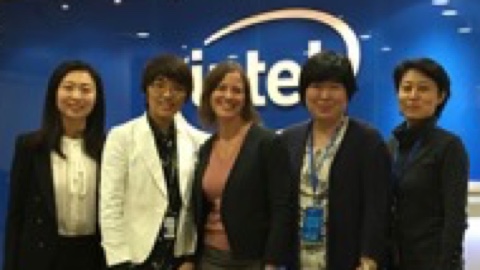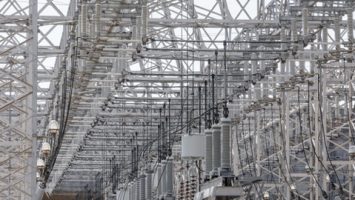
As a multinational company and technology driver, Intel has been investing and operating in China for 30 years. Their strategy is for doing business in country is to “Innovate with China” and it is proving to be a strong one. Given the most recent economic slowdown, the Chinese government’s response is to “introduce progressive policy to remove the barriers” and encourage innovation, which turns out to be a perfect fit for Intel.
I had the pleasure of meeting with several key leaders at Intel China Ltd. including Julia Zhu, Director of Corporate Affairs; Nancy Yang, Director, Mass Makerspace Accelerator; Carol Qin and Maggie Zhang both with the Corporate Affairs Group. This small team is doing amazing things that are having a fundamental and radical impact on thousands of budding entrepreneurs.
As part of Intel China’s “Maker Go Big” initiative, they are implementing a two-pronged strategy that includes support and the founding of joint Makerspaces across the country as well as hosting US-China Young Maker Competitions. Their efforts have shown incredible results in just a few short years. Their passion and commitment is contagious, and as I learned more it became clear that this is the beginning of a truly global movement for good.
The Maker Spaces began as a way to provide a place for people – especially young people – to access technology and explore their ideas. Learning from the US model and with the support of the Ministry of Education, they launched a joint innovation center in one university in 2014, which quickly evolved into the Mass Makerspace Accelerator in 2015.
They are now successfully expanding the program both to universities across the country and through industrial parks. There are 13 joint maker spaces (five in the universities and eight in local industrial parks). In addition, they are adding an online component to further extend the reach. Entrepreneurs enjoy a broad base of support including lab space, equipment, curricula, mentors and networks, which enable them to accelerate the process from idea to product in market.
The second prong of their approach includes Young Maker Competitions, an expression of a policy for People-to-People Exchange and ecosystem development, of which Intel is the initiator and co-organizer. What began as an effort of four regions and a few hundred people has expanded in its third year to nine cities in China, plus the US with nearly 3,000 participants. That is impressive scale and impact. Already there are success stories coming from the competitions including a product developed by a young entrepreneur named Cao Hui who developed a tracking sensor, app and community for snowboards. Thanks to the support from the Young Maker Competition she was able to go from concept to market in only one year.

The Young Maker Competitions are a highlight youth activity for the US-China People-to-People exchange, which will be hosted by US government in the coming year. This is an incredible opportunity to not only showcase the innovations of young entrepreneurs in both the US and China, but also to demonstrate how China and the US can work together to increase access to technology, increase the potential for innovation to impact economies and to decrease the digital divide.
I left our meeting at Intel with the feeling that a few properly motivated people, given the right resources and support, can truly change the world. Ms. Zhu and her team are thinking big and investing their time, energy and efforts in the long-term success of next generation of innovators. Because the primary driver for these efforts is rooted in education, there is a very person-centric ethos at work. For example, thanks to these programs, more than 15 million teachers have been trained globally on innovation and technology as a way to decrease the digital divide and increase the ability for all students to thrive in the modern age.
This is very real work that goes way beyond traditional Corporate Social Responsibility (CSR) efforts. This isn’t about buzzwords, photo ops or quick hit press. These are real and remarkable efforts to showcase innovation as a way forward. It enables a new generation of entrepreneurs to create their own economic opportunity instead of waiting for it to appear and being distraught when it doesn’t.
As I’ve experienced with each and every meeting I’ve had here in Beijing, there is a huge push to create a win-win collaboration between the central and local governments, global companies like Intel, universities and other partners, while also extending to the US. From this vantage point it seems that everyone is on point. There is clarity about their role, their strengths and their dependency on each other. In other words, the policy makers provide clarity and support and the private sector does what it does best – encourage innovation to thrive. The result is a clear road map and rapid acceleration. The US can learn a lot from this kind of structure and efficiency. I hope we can open our minds and learn these lessons.


